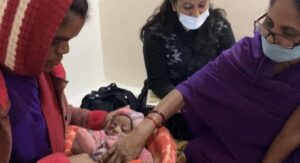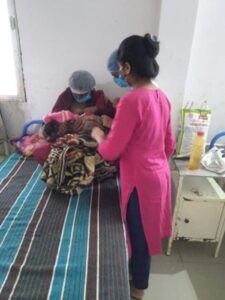

According to the NFHS 5, 60% of children in rural India are not breastfed within one hour of birth. At the state level, in Madhya Pradesh, this figure is about 57%.
“Bacha paida hote hi ek ghante ke andar bache ko doodh pilana” (Breastfeed your baby within one hour of delivery),” says the ASHA to pregnant women and new mothers to ensure they initiate early breastfeeding immediately after the birth.
Practising this can boost the immunity of newborn babies, reduce the risk of diarrhoea, and significantly lessen neonatal mortality. Furthermore, breastfeeding also has a positive impact on the mental well-being and bonding between a mother and child.
Early initiation of breastfeeding is an indicator of quality comprehensive care at a facility. One does not only need to concentrate on breastfeeding a newborn at the delivery site. A more comprehensive approach is needed. It is a series of interventions on awareness and behavior change—right from the community up until the delivery of the child, and after the mother and child are back at home. Thus, an integrated intervention approach that works at different levels of health service delivery is required.
The Antara Foundation (TAF) works along with the Women and Child Development Department and the Health Department to improve the health outcomes of mothers and children in rural Madhya Pradesh.
TAF focuses on the critical period of 1000 days, this period accounts for the conception of the child, a period of nine months of pregnancy and the first two years of the child’s life. This approach ensures that from the time of pregnancy up-until the postnatal period, a mother and her child receive the right treatment from the public health facilities. This includes early initiation of breast-feeding and exclusive breastfeeding for six months. TAF follows an integrated approach to breastfeeding and other aspects of maternal and newborn care. Our aim is to involve multiple actors and strengthen the existing health system at every point to ensure safe delivery and proper after-care for the mother and child.
Working with the community through frontline workers
At TAF, we work closely with the frontline healthcare workers (FLWs) to help build their capacity and knowledge. At the ground level, we conduct classroom training for FLWs. This includes practical insights, theoretical knowledge, and updated guidelines related to maternal and child health. Through classroom training and on-field hand holding, FLWs are trained on the essentials of breastfeeding. Trained FLWs are well-equipped to counsel a pregnant woman and her family on the importance of early initiation of breastfeeding. They talk about various social norms which might be detrimental to breastfeeding and educate the family on healthy practices to be followed. The FLWs introduce the mother and family to the importance of breastfeeding as part of preparations for the delivery, creating a conducive environment for early initiation of breastfeeding. In our TAF intervention districts, we have conducted training for around 2500 Auxiliary Nurse Midwives (ANM) and Community Health Officers(CHOs).
Working with supervisors to ensure support to FLWs and beneficiaries
Along with building the capacity of frontline healthcare workers, it is also essential to strengthen the supervisory cadre. TAF provides technical training to both sector and block supervisors. In our intervention districts, we have fully trained around 1000 supervisors. Additionally, we focus on how they can perform their supervisory roles better; we provide them training on data use and effective planning of their visits. The supervisors can then guide FLWs in ensuring the right messages are disseminated on breastfeeding. The supervisory cadre conducts joint visits along with the FLWs to mothers and their families, especially in challenging cases where family members are not easily convinced of the importance of breastfeeding or continue to believe in potentially harmful myths about feeding the baby, for instance, throwing away colostrum, and feeding honey to the baby after delivery.
Working with facility staff at delivery points
At delivery points, the health staff are trained by TAF’s nurse mentors to ensure that on the day of delivery, the pregnant woman is provided with the necessary support for breastfeeding to happen at the earliest. Nursing staff are taught the importance of early breastfeeding, how to counsel the mother and family, guide the mother on proper feeding techniques and how to support a mother who may be facing difficulties. TAF also works with the staff to improve the quality of the labor room, prevent accidents during delivery, and ensure that the mother has a safe delivery experience, improving her mental and physical state for breastfeeding. Khushboo Gedam, a staff nurse in PHC Dhuma, has commented, “Nurse mentors from TAF’s Akshita program train us on crucial topics like pre-eclampsia, PPH (post-partum hemorrhage) management and breastfeeding. Due to their training, we can counsel mothers on breastfeeding effectively and properly”.
On this World Breastfeeding Week 2023, as public health practitioners, we reaffirm the need for a holistic approach to improve breastfeeding practices that works along the entire continuum of care from the pregnancy to the postnatal journey. This must be an approach that works at every level of the public health delivery system and empowers both the service providers and the community towards creating a healthy life for every mother and her newborn.

An example of TAF’s peer learning training session. In the image, ASHA workers under the supervision of an ASHA supervisor demonstrate how to do an HBNC visit (Home Based Newborn Care) in Chhapara block, Seoni, MP.

A nurse mentor of TAF training the staff nurse on the importance of early initiation of breastfeeding and exclusive breastfeeding at PHC Dhoma, Seoni, MP.